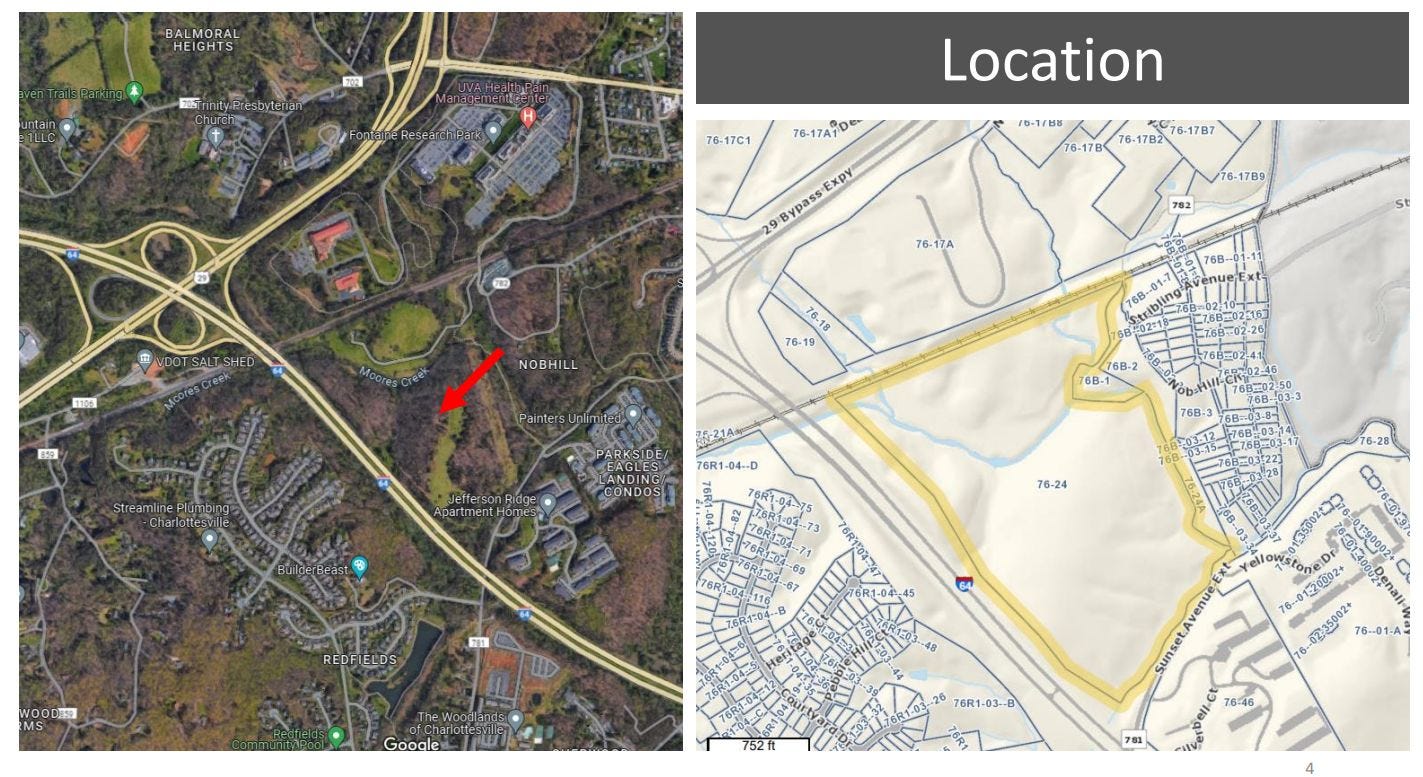T ’was the day before Thanksgiving and all through the town, many people have left and others are in renown. Charlottesville Community Engagement is not known for couplets but perhaps its time to start a tradition? In any case, it’s November 22 and there are only so many days left to catch up on stories that still await to be written this year. I’m Sean Tubbs, and I guess I’d better get to writing.
On today’s program:
The first bills have been filed for the 2024 General Assembly
Riverbend Development will take a little more time to develop plans for the Granger property south of UVA’s Fontaine Research Park
The Albemarle County Planning Commission reviews the draft housing goals in the AC44 Comprehensive Plan update
First shout-out: Charlottesville Community Bikes
In today’s first subscriber-supported shout-out: Saturday is Small Business Saturday, and Community Bikes is preparing to celebrate! On November 25, the organization will be celebrating 90s Day with 25 percent off of 90s rebuilds followed by a 90s ride at 3:15 p.m. Learn more on Instagram!
Stopping by would be a great way to help celebrate Community Bikes surpassing its 2023 goal of distributing bicycles for both kids and adults! The organization expresses their heartfelt thanks to those who have kept bike donations rolling through their doors. They also want to express endless gratitude to the staff and volunteers who lovingly restore donated bikes, ensuring they are safe for their new owners. So celebrate Small Business Saturday this week at Community Bikes!
To find out more and learn about the recent donation of a new van donated by Geico, visit communitybikes.org!
First bills filed for 2024 General Assembly
There are seven weeks until the General Assembly begins, or 42 days if you’d prefer to calculate that way. Democrats will control both the House of Delegates and the Senate for the second half of Republican Governor Glenn Youngkin’s administration.
Here’s a look at the first bills filed so far which indicate the majority party will try to use its slim margin in both chambers.
Delegate Jeion Ward (D-87) has filed a bill to increase the minimum wage to $13.50 an hour by 2025 and to $15.00 by 2026. (HB1) Senator Louise Lucas (D-18) has filed a companion in the Senate (SB1).
Delegate Dan Helmer (D-10) has filed legislation to make it a class 1 misdemeanor to trade or possess assault firearms and large capacity ammunition feeding devices. (HB2) Senator Creigh Deeds (D-11) is carrying the same bill in the other Chamber (SB2).
Delegate Tony Wilt (R-34) has filed a bill to repeal a requirement that the State Air Pollution Control Board implement standards for no-emissions and low-emissions vehicles by 2025. (HB3) Senator Richard Stuart has filed the companion bill (SB3).
Delegate Charniele Herring (D-4) has filed for a Constitutional amendment for the fundamental right to reproductive freedom (HJ 1). Multiple patrons are carrying the bill in the Senate (SJ1)
Delegate Elizabeth B. Bennett-Parker (D-5) has filed a Constitutional amendment that would restore voting rights to those who have served time for a felony upon the end of their release from incarceration (HJ2). Senator Mamie Locke (D-23) has introduced the same bill in the Senate. (SJ2)
Senator Bryce Reeves (R-28) has filed a bill to allow Orange County to establish a department of real estatement and to enter into a joint arrangement with an adjacent locality (SB9)
Riverbend seeking deferral on 200-unit development of Granger Property
Earlier this year, Riverbend Development filed an application for a rezoning of undeveloped land just south of the University of Virginia’s Fontaine Research Park that is cut off from vehicular access by the Norfolk Southern railroad.
The company’s latest plans for the Granger property would see 200 units built on the southern portion of the 70-acre tract with access onto Sunset Avenue Extended. Previous discussion of this property has included talk of a roadway called the Sunset-Fontaine Connector.
“When constructed, the Sunset-Fontaine Connector should be a two-lane urban street with curb, gutter, sidewalks, street trees, and bicycle lanes,” reads a portion of Albemarle’s Southern and Western Neighborhoods Comprehensive Plan.
Albemarle staff sent out comments to Riverbend Development on October 27 and generally found the project to be favorable.
“The application is generally consistent with the Comprehensive Plan’s recommendations for the property, but could be strengthened with additional improvements shown along Sunset Avenue,” reads the comments. “These recommendations include sidewalks, street trees, and bicycle lanes along Sunset Avenue and connections through the Granger property to Stribling Avenue.”
That portion of Stribling Avenue is a two-lane gravel road that extends from the city neighborhood out to Fontaine Avenue.
The comments asked for more details to be provided.
A community meeting was held for the project last Thursday at the November meeting of the 5th and Avon Community Advisory Committee. Recordings are not available and I did not attend, but we learn from the materials that Riverbend is seeking more time to respond with revisions to the plan. They have until May 2024 to resubmit. (view the staff presentation)
Second shout-out: Virginians for High-Speed Rail forum on November 27
There’s been a lot of activity in passenger rail in Virginia in recent years, but what’s really going on? On Monday, November 27, Virginians for High-Speed Rail will hold the latest in a series of Town Halls with a look at the Virginia State of Rail 2023. Three top officials will give a briefing. They are:
Jennifer DeBruhl (Director of VA Dept. of Rail and Public Transportation)
DJ Stadtler (Executive Director of VA Passenger Rail Authority)
Rich Dalton (CEO of VA Railway Express)
You can find the videos of the first two programs in this year's series here: Impact of the IIJA on America's Rail Network and A Net-Zero Amtrak for a Sustainable Future.
Register for the event at vhsr.com!
Albemarle Planning Commission urge a balance of aspiration and realism in county’s housing goals
The second phase of Albemarle County's four-phase review of the Comprehensive Plan is winding down. Learn more about where AC44 is in this recent story and then come back and read the rest of this one.
On November 14, 2023, the Planning Commission discussed the goals and objectives for two draft chapters. One is on Housing and the other is on Economic Development.
"We want to make sure that we're on track before we dive into the action steps and see if anything may be missing so far," said Tori Kanellopoulos, a principal planner in Albemarle's Community Development department. “Goals are the vision for where we want to be as a community in the future and the objectives are the outcomes or targets to move us in that direction. The action steps are how we implement the plan.”
Questionnaires are still available through the end of the year for several of the chapters. One of them is on the housing chapter which has a whole report for you to read if you’re so interested. (take the survey) (read the report)
The first draft goal of the housing chapter reads: “Albemarle will increase the overall housing supply and housing choice with a variety of housing types to meet the diverse housing needs of current and future Albemarle County residents.”
“Having housing choice available in our community is an important aspect of the comp plan,” Kanellopoulos said. “That refers to having a variety of housing types at a variety of price points. This allows for more options based on preferences, life stages, household size, and household income. Housing is considered affordable when a household spends no more than 30 percent of its gross monthly income on housing costs.”
The Housing chapter will build off of the Housing Albemarle policy that was adopted by the Board of Supervisors in July 2021. The overall goal is to provide direction to reduce barriers to production of more housing. Some input has already been received through the survey process.
“Feedback includes a need for infrastructure to keep up with growth, coordination on regional housing, more requirements and incentives for affordable units with new development, more market rate units, more affordable real estate taxes, and ways to measure success,” Kanellopoulos said.
Feedback was also taken at a virtual open house on November 6 at which a handful of people attended as well as a listening session at JABA. Input from all of these events carries a lot of weight.
“To summarize the input from both of these events, we heard that there is concern about the limited supply of land in the development areas, that affordable housing in the rural area could be explored, and that community land trust and county-owned land should be explored for affordable housing,” Kanellopoulos said. “We also heard that affordable housing specifically planned for seniors is needed with accessibility, walkability, transit, and safe places to gather on site.”
Commissioner Nathan Moore said he thought there were a lot of lofty goals but he was concerned about specific steps to ensure implementation happens.
“The goals here are not what I would think of as goals,” Moore said. “They’re more like vision bullets. And even the objectives, I kept writing down how? How? How? There’s a lot of laudable things in the mix. Some just so broad that it’s like: What is this saying? Like, prevent homelessness where possible through homelessness prevention. Okay.”
Moore said more needs to be done to ensure that people who work in Albemarle can afford to live within its boundaries.
“I’ve been thinking about how we all think about a good community and it can be walkable, and it can be bikeable and it can be environmentally but if our baristas and our [Certified Nursing Assistants] and our firefighters have to come in from Greene or have to come in from Waynesboro or have to come in from Fluvanna, it’s not a community, it’s a theme park,” Moore said.

Moore called for consideration of an upzoning like the one happening in Charlottesville in order to help the county meet its goal of building over 10,000 new units by 2040.
Commissioner Lonnie Murray agreed with Commissioner Moore’s support for investment in land trusts, but disagreed on another of his points.
“I would not be a fan of broad upzoning since it can cause speculation making land and homes even less affordable and also it could remove any incentive for affordable housing, Murray said. “If you already have the zoning you want, there would be no reason to proffer affordable housing.”
Murray also said many barriers to development are in place to ensure that impacts to the environment are mitigated and that people who will live in the new developments will be safe.
“I think there’s a difference between barriers and unnecessary barriers and so I would encourage injecting the word ‘unnecessary’ in there to recognize that not all barriers are necessarily bad,” Murray said.
Commissioner Karen Firehock said she supported feedback that encouraged the county to allow construction of so-called “tiny” houses.
“I think though that we’re going to have to really investigate our zoning because right now there is really no way to build a tiny house community in Albemarle County,” Firehock said. “Not everyone wants a patch of lawn that they have to mow. A lot of people would like to have a commons and a community garden that they can all take care of.”
Firehock echoed Moore’s concern about some of the goals and objectives being vague. She offered some specifics.
“I’d like to see more on mortgage downpayment assistance for public service sector employees,” Firehock said. “So for example, police and fire, teachers. Some communities have really robust programs that help subsidized the down payment.”
Commissioner Fred Missel also wanted the language to be a little bit more pointed and perhaps a little more realistic.
“I would encourage us to focus on a balance between aspiration and achievable,” Missel said. “Because oftentimes we say things that we feel are right and they are right but we don’t end up having the ability to achieve them.”
For instance, Missel pointed out that the Housing Albemarle plan came with a requirement that 20 percent of new units in a rezoned development be affordable at a lower price point than 80 percent of the area median income. But he added that’s not been implemented because a series of incentives for developers has not yet been finalized.
“It’s been two years and we’re still seeing applications at 15 percent at 80 percent AMI for ten years,” Missel said.
Commissioner Julian Bivins said he was skeptical the county will be able to make gains on affordable housing goals until it reexamines the long-held growth management policy that restricts development to roughly five percent of the county.
“I don’t know how you create any program that will change the return on investment that the developer looks at,” Bivins said.
Bivins added that if the county does stay within the current growth area boundaries, more efforts need to be made to shore up the transportation network.
“My sense is that if we are absolutely committed to five percent than we need to be very creative on how we bring and connect the five percent across the city of Charlottesville so that we have a much broader network,” Bivins said.
Bivins expressed skepticism about whether the county and the city would be able to cover the cost of everything needed to make that happen.
Commissioner Missel also said if the county is going to grow, it’s going to need money to pay for infrastructure to go with more people. He said there should be a Comprehensive Plan goal about the reality of funding needs.
“In looking at Northern Virginia and the other areas, the funding and the commitment from the localities is so strong that I think unless we really purposely and intentionally growing that, we’ll not be able to achieve anything that is not just aspirational but actually actual,” Missel said.
Commissioner Moore also said that the county needs to increase the amount of money that goes to address issues, citing affordable housing as one area where the Board of Supervisors has invested.
“We also have a lot of wealth in this community to do something about it,” Moore said. “We may not have the political will but we’ve got the capacity and we have a recent history of investing in public goods, things that the Board of Supervisors decided are public goods. We just bought up a whole lot of land around Camp Rivanna to subsidize the military-industrial complex. There’s good reasons to do that in the case they did, but we could do similar with other things.”
Moore referred to the decision in May to spend $58 million to purchase 462 acres near Rivanna Station in order to help stop the land from being bought by others who might encroach on the U.S. Army. The county continues to conduct due diligence of the site and to seek other partners to help cover the cost to buy the land. The transaction with developer Wendell Wood’s United Land Corporation of America has not yet closed.
The Planning Commission also discussed economic development at their meeting on November 14. You can view the entire meeting on YouTube below.
Next up for AC44: The Albemarle Planning Commission will meet with the Board of Supervisors on December 4. That meeting will be at 1 p.m. at the North Fork Discovery Park.
Reading material:
University voices objection to proposed 10-story Ivy Road apartment building, Cecilia Mould, Cavalier Daily, November 15, 2023
UVa attempt to kill 10-story apartment building thwarted, Jason Armesto, Charlottesville Daily Progress (paywall), November 17, 2023
Afton Mountain fire contained, Reynolds Hutchins, Charlottesville Daily Progress (paywall), November 18, 2023
Charlottesville financial planners expect $7.7M budget surplus, Hawes Spencer, Charlottesville Daily Progress (paywall), November 20, 2023
Water pressure returns in Greene County, but E. coli still a risk, Charlottesville Daily Progress (paywall), November 20, 2023
Democrats file bills for the upcoming session, Brandon Jarvis, Virginia Political Newsletter (paywall), November 20, 2023
End of #605
It is the penultimate day before Thanksgiving and I took a holiday yesterday but not sure when I’ll return with a new edition. There is a lot to still write about to preview Charlottesville City Council’s December 5 public hearing on the Development Code, and I’m hoping to get something posted by Monday. Take a look at my page on Substack Notes to get updates.
I just have to say I’m grateful to all of you for reading or listening to this, whether you’re paying for a subscription or not. I mostly want to make sure that the audience keeps growing so I’ll keep going. I do all of this work out of a conviction that communities need access to what gets discussed by appointed and elected officials, and an informed public seems to make more sense than an uninformed one.
I’m grateful to Ting for their unique sponsorship where they match people’s initial subscriptions on Substack! I wish them Thanksgiving, and hope you’ll check them out if you need high-speed Internet.
If you sign up for Ting at this link and enter the promo code COMMUNITY, you’ll get:
Free installation
A second month for free
A $75 gift card to the Downtown Mall


















Share this post